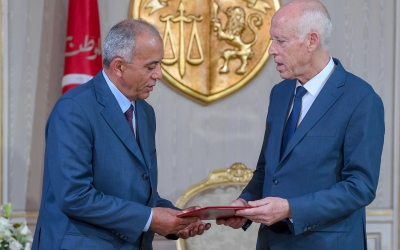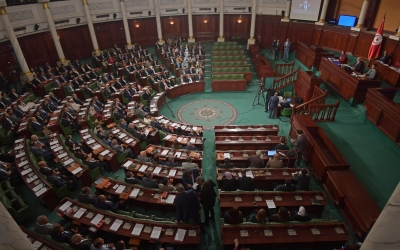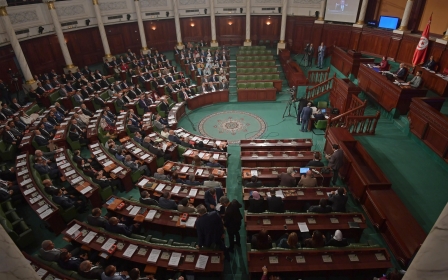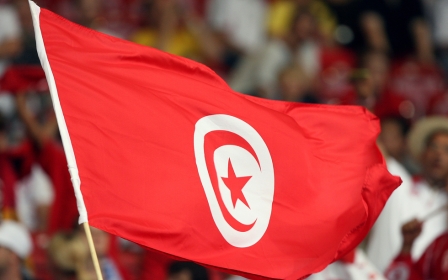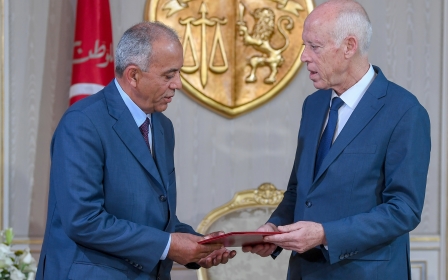Tunisia's government formation stalls as parties fail to agree on cabinet

Tunisia has been struggling to form a new government since the country's parliamentary elections in October resulted in a hung parliament.
In mid-November, Habib Jemli, an agricultural engineer who describes himself as an independent, was tasked by Tunisia's president with forming a new government.
Jemli’s deadline of one month - renewable once - to form a government expired on Sunday. His next deadline is mid-January, but his negotiations to form a cabinet have yet to bear fruit.
Jemli has been the choice of the largest party in parliament, Ennahda, which won the most seats in the 6 October elections.
The Muslim democratic party won 52 seats out of 217, but needs major support from smaller parties to carve out the 109-seat majority needed to form a government.
Liberal newcomer Qalb Tounes came second with 38 seats, followed by the Attayar party, which gained 22 parliamentary seats.
Apart from the two winners, all of the other major political parties have vowed to join the opposition in the wake of the elections.
"Our political class does not demonstrate any sense of urgency," Leila Chebbi Ayari, president of the Irtikaa Association for active female participation, told Middle East Eye.
"We cannot bear the costs of another wasted year of political paralysis."
Jemli, 60, is facing an uphill challenge in forming a team capable of winning the support of the majority of MPs.
If he cannot form the coalition, the president can ask another candidate to try. If that also fails and a deadlock persists, there will be another parliamentary election.
With most parties failing to come to an agreement to form a coalition, the delay in forming a new government risks further delaying the reforms necessary for reviving the economy.
"Too bad Attayar decided not to join the new coalition. It's a loss for the party and for Tunisia," Radwan Masmoudi, a prominent member of the Ennahda party and president of the Washington-based Center for the Study of Islam and Democracy, posted on Facebook.
Disagreement and disappointment
An alliance between Ennahda and its main electoral rival Qalb Tounes, which came second in the October poll, has yet to materialise.
Both parties have forsworn any liaison with the other during the electoral campaigns.
For members of Qalb Tounes, the stalemate is not a surprise.
"Ennahda will never hand the key portfolios of the ministries of Justice, Interior and Administrative Reform to another party. You can bet your life on it," Samy Achour, a member of Qalb Tounes' policy committee told MEE.
Ennahda itself has not denied its disagreement with other parties.
“Attayar and Achaab thought they could impose their conditions, but Ennahda and Jemli rejected them as unacceptable and humiliating,” senior Ennahda member Radwan Masmoudi told MEE.
'We have to put aside our differences for the sake of our country'
- Samy Achour, Qalb Tounes' policy committee
However, Mohamed Abbou, the leader of Attayar party, had another story to tell.
"We were close to a compromise: Jemli promised Attayar the Ministry of Justice, and that the other ministries would go to independents. But Ennahda didn’t accept it. Arrogance prevailed," Abbou told reporters earlier this month.
Since 2018, Tunisians have been living with a semi-functioning government.
Disappointment with the results of the local elections within former ruling party Nidaa Tounes in May catalysed a political crisis over the political tenability of its PM, Youssef Chahed, and propelled political parties prematurely into campaign mode.
"Tunisia urgently needs a functional government to break deadlocked economic reform projects. We are seriously worried," Tony Verheijen, the World Bank resident representative of Tunisia, warned in a recent interview with Business News.
The World Bank frames its message in the context of a projected record-high public debt of over 89 percent in 2020, a loss of purchasing power of 40 percent, and a youth unemployment rate of nearly 35 percent.
Chebbi Ayari says the first priority for the upcoming government should be fighting corruption.
"Corruption is a scourge that has to be combatted if Tunisia is to achieve political and economic stability," Chebbi Ayari says.
A quick restart of political reforms did well as a campaign promise, she said.
'I'm happy not to be in the PM's shoes'
Political infighting and vested interests have stalled the implementation of the recommendations of the transitional justice commission and constitutional reforms, she added.
Qalb Tounes' Achour says he is well aware of Habib Jemli's challenges. "I'm happy not to be in the PM's shoes," Achour said.
"A bunch of unpredictable political parties and the legacy of the former government makes for a very uncertain situation."
To political analyst and author Amine Snoussi, political risk aversion is a logical explanation for the lack of appetite to join a government coalition.
"Apart from possible personal gain, I see little benefit," he told MEE.
The unfortunate destinies of Ennahda's successive former coalition partners demonstrated the risk of governing with the Muslim democrats.
The Muslim democrats have been accused by their opponents of being a "coalition partner killer".
None of its former government partners - the CPR (former party of Attayar's leader Mohamed Abbou), Ettakatol and Nidaa - politically survived a government term with the party.
"Ideology is their unique selling point. The other parties are based on short-lived political trends," Snoussi said.
Qalb Tounes and Ennahda show a bigger appetite for risk.
"Opposition might be easier," Masmoudi says, "but Ennahda is the biggest, most organised party in Tunisia. If it cannot govern, I don't think anyone can."
"We have to put aside our differences to forge progress for the sake of our country," Achour from Qalb Tounes said.
Feminist activist Chebbi Ayari suspects less altruistic motives: "Both parties have a strong self-interest in coalition participation," she states.
"Qalb Tounes needs to ensure legal protection for all corruption crimes committed by its leader, while Ennahda is pursuing authority over the legislative body," she told MEE.
"Ennahda administers a significant part of the Tunisian bureaucracy and runs that as a state in itself," said Snoussi.
Independence as 'marketable product'
Meanwhile, former coalition candidates Attayar and Achaab seem to have found their niche in the opposition.
Together with a few independent MPs, they form the number one block in the opposition, which would automatically grant it the chairmanship of the parliamentary finance committee.
Qalb Tounes, despite being dismissed by the PM-designate, is "still open to talks", Achour of Qalb Tounes' political committee said.
"Anything is possible, but two things are certain: firstly, Qalb is the country's second-largest party and secondly, the party has a pragmatic and convincing social-economic programme."
Political analyst Snoussi believes that most parties "are ready to take part in a government coalition masqueraded as independent".
'I foresee a coalition composed of competent people outside of politics and ideologies. Nobody wants new elections'
- Radwan Masmoudi, analyst
Habib Jemli has said that cabinet members will be chosen based on their competence and integrity, not their political affiliation.
Independence is a marketable product in Tunisia. The idea of a coalition of competent technocrats popped up frequently under the previous government as a miracle antidote against the subsequent political stalemate.
President Kais Saied, the self-styled proponent of independence, won the 2019 presidential elections with a landslide.
Ennahda member Masmoudi seemed to confirm Snoussi's theory:
"I foresee a coalition composed of competent people outside of politics and ideologies. Nobody wants new elections."
Samy Achour of Qalb Tounes echoes the same sentiment.
"Our economic situation urges pragmatism and we want to contribute under the condition of a neutral, non-partisan government," Achour says.
"It is a sellable way out," Masmoudi says, while defining the suggested liaison between Tunisia's political foes as a "cohabitation out of necessity".
Middle East Eye propose une couverture et une analyse indépendantes et incomparables du Moyen-Orient, de l’Afrique du Nord et d’autres régions du monde. Pour en savoir plus sur la reprise de ce contenu et les frais qui s’appliquent, veuillez remplir ce formulaire [en anglais]. Pour en savoir plus sur MEE, cliquez ici [en anglais].


